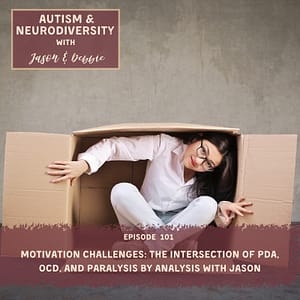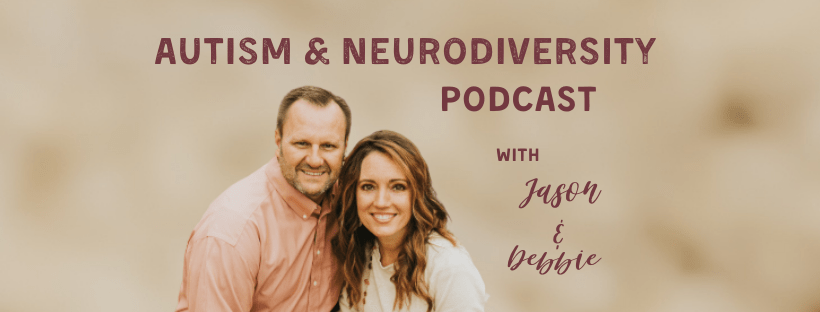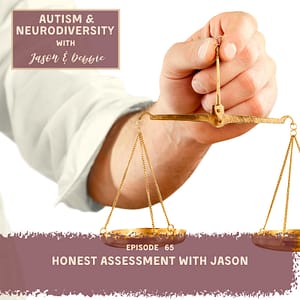[00:03] Jason: Welcome to the Autism and Neurodiversity podcast.
[00:06] Debbie: We’re here to bring you helpful information from leading experts and give you effective tools and support. I’m Jason Grygla, a licensed counselor and founder of Techie for Life, a specialized mentoring program for neurodiverse young adults.
[00:19] Jason: And I’m Debbie Grygla, a certified life coach. And maybe most importantly, we’re also parents to our own atypical Young Adults.
[00:30] Jason: Hello. I hope you’re having a wonderful day. This is Jason Grygla on the Autism and Neurodiversity podcast.
Today I’d like to talk to you about a perspective that is important and that I think most of you will recognize.
And maybe I can expand your perspective a little bit more. I remember hearing long ago a really great statement that said we should always judge a teenager on their single best day of the year because everything else, all the other days are just pollution and distractions.
I think if we’re going to judge, it is important to judge them on their best.
I’ve also heard that when we do assessment that we need to do honest assessment and call it like it is, without any emotion or feeling or bias. And when we do honest assessment that that is not judgment and that they are very separate.
So I’d like to talk a little bit about maybe a philosophical difference between assessment and judgment, because I think honest assessment is really important, but we don’t pass judgment because that puts us in a bad place and sets us up for failures and sets the people we love up for failures. And so when we’re trying to mentor and influence, we want to judge them on their best day, but do honest assessment about who they are and how they are and why they are.
So let’s talk about that for a second. When we look at learning disabilities, we define those as having a discrepancy between a baseline and a specific learning area.
So if a child gets tested for a learning disability and they are straight across the board, low IQ, low functioning and not intelligent, there is no learning disability. They are just low IQ, and that’s hard. They still might need services, but they might not get them because there’s not an actual learning disability. They’re just not very bright to have a learning disability. They need to be smart in several areas or most areas, and they have one, two or three really low areas. That is clearly a discrepancy that isn’t judged by low IQ, but by the differences in the peaks and the troughs in a graph.
And when we talk about neurodivergent brains of any kind, whether it’s a developmental disability or whether they’re just quirky, almost all of them have highs and lows in their functional abilities, in how their brain works. Most of them have some type of disability, like a learning disability, or a social learning disability, or a functioning disability and organizational disability, where they have a hard time with their executive functioning and yet they have highs and lows and it makes it really hard.
And it was common for many of many of those who are somehow neurodivergent that when they were children they had higher highs than their peers and they might have been able to do math really young, at an amazing age or memorize details way beyond their expected developmental stage or their age stage, their development age. Maybe they could build things or create things out of Legos or machines that were beyond what that age should have been able to do.
And so those highs set us up as parents, teachers and mentors to have huge expectations and high expectations and hopes, only to have those crushed and dashed several years later. When we started to realize that when neuro pathways in the brain are strongly aligned in the intellectual directions for understanding patterns and details and engineer type brains, that they often were lacking in neural pathways in the social emotional understanding of the brain. That doesn’t mean they have less emotions or have less needs for social. It just meant that their ability to manage those and understand those and to get those needs met is largely troubled.
And when we look at someone whose brain is highly developmentally disabled. Severely autistic. And yet they are a savant. Someone who has an extraordinary talent for reading. Writing. Math. Music. Art it’s because the neural pathways are so strongly aligned in one area that they are savant level amazing.
Which meant that they had to have neuropathways taken from other areas of the brain so that they are extremely disabled in those areas. And savants aren’t that common. I think people who say every autist must be a savant in some area, I don’t think that’s fair. I think we have people with autism who have high IQs and who have low IQs, some who have intellectual strengths and some who have creativity strengths.
We do know that music and technology are closely related because there’s a science to both of those. Some people say math is the perfect language and some say that music is the perfect language. And I think they’re actually both right.
Anyway, our expectations and how we view the difference between their strengths and their weaknesses can cause us and our ability to mentor a huge amount of frustration and dysfunction. The biggest meaning being that we’re disappointed, we’re sad for our child, we’re sad for the hopes and the dreams.
And one of the problems is we as parents actually want to judge our children by their best strengths. And if they have a redeeming quality as a student at Techy for Life or as an applicant to come to Techy for Life, we always look at that and say, is there something we can do with that specific strength?
And we call it a redeeming quality because it means there’s one area or more than one area that we could actually benefit and grow and magnify and develop that will give them a better life. And most young adults who come to us for sure have redeeming qualities that we can work on.
So I don’t know if I’ve ever seen someone who didn’t unless we were getting into low functioning autism or brain development disorders where they are nonverbal and then it’s hard because there’s just not enough there to work with.
So we want to judge them on their strengths but then the reality of life and functioning is they fall apart based on their lowest weaknesses. I’ll give you an example. When our students are hired at a job, more often than not or anyone who’s neurodivergent, more often than not they are hired for their strengths and they are by far more likely to lose their job, quit their job or get fired. And that is always because of their weaknesses.
Their strengths get them the job, their weaknesses make them lose their job. And so when we are looking to do honest assessment we cannot afford to ignore their lowest denominator, their lowest weaknesses. If they are an amazing, whatever computer programmer or It or tech or whatever it is but they have an anger issue that nobody can work with them then they’re not going to be a successful employee.
If they are amazing at a skill but they can’t communicate or won’t communicate then they’re not going to be a good employee. If they do really good work but it’s so inconsistent then it’s really hard to find a type of job where you can get paid for what you produce but the job has no expectations about when you produce, how much you produce and it’s all on you. They’re just grateful that you’re producing something even if it comes in burst or spurs.
Those are hard jobs to find because we all work in teams and systems where production needs, deadlines and expectations are real and that’s what business is about is providing a service or a product at the right time and in the right way.
And when we’re looking at the people we are mentoring. It’s important to do honest assessment based on what is going to get them fired or make them lose their friend. An example would be when that person actually is a great friend and loyal and fun to be around. But that one weakness of losing their temper or that one weakness of being selfish or lying. It will kill all of the other positives and they’ll lose their friend. Because to keep a friend you have to be pretty good at everything and not perfect at anything but good enough. But if you’re good enough in almost everything but there’s one area that you really fall down in you’re not going to have any friends. And the reality is you get the consequences of what you’re capable of.
And so we have to sum and add up and average the weaknesses and the strengths for functionality. So look at their weaknesses and keep your eyes wide open. But as far as judging goes, we judge them based on their best qualities and who they want to be. If there wasn’t the confusion and pollutions of having a different brain, and that life is really hard. So we work like crazy to help maximize success for their strengths and minimize or mitigate their weaknesses, and we have to do both.
I wanted to share that with you today. And as a parent, I remember feeling torn between acknowledging their weaknesses because it made me feel like I was judging. And then when I ignored their weaknesses and just focused on their strengths only because I didn’t want to judge, then I actually didn’t help them overcome their weaknesses, and then they didn’t benefit, and they got hurt because of it.
My job is to help them be better, not just to always tell them everything’s perfect, and certainly not to only focus on their weaknesses. So it’s the balance that we do. We are the enemy of the part of them that wants to be lazy and fail, and we are the enemy of their dysfunction, but we are the friend and hero of the part of them that wants good and that needs to have their needs met, whether they understand it or not.
Thank you for being who you are. I’m sure those of you who are listening are trying to be good. Parents, therapists, mentors, psychologists, teachers. Anyone who works in this field has a special place in my heart, and those who work in this field understand why we do it. So thanks for who you are and keep up the honest assessment and the judging honestly of their heart and their potential, and we’ll talk to you another time. Thanks. Bye.
[13:07] Debbie: Thanks for joining us on this episode of Autism and Neurodiversity with Jason and Debbie. If you want to learn more about our work, come visit us at jasondebbie.com.




